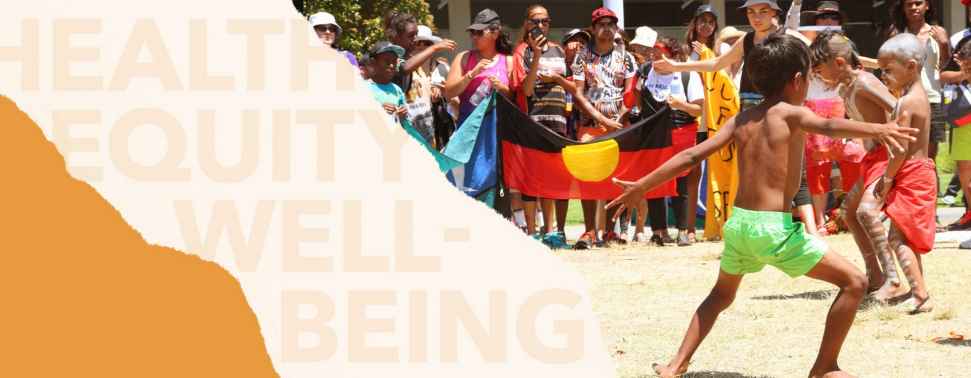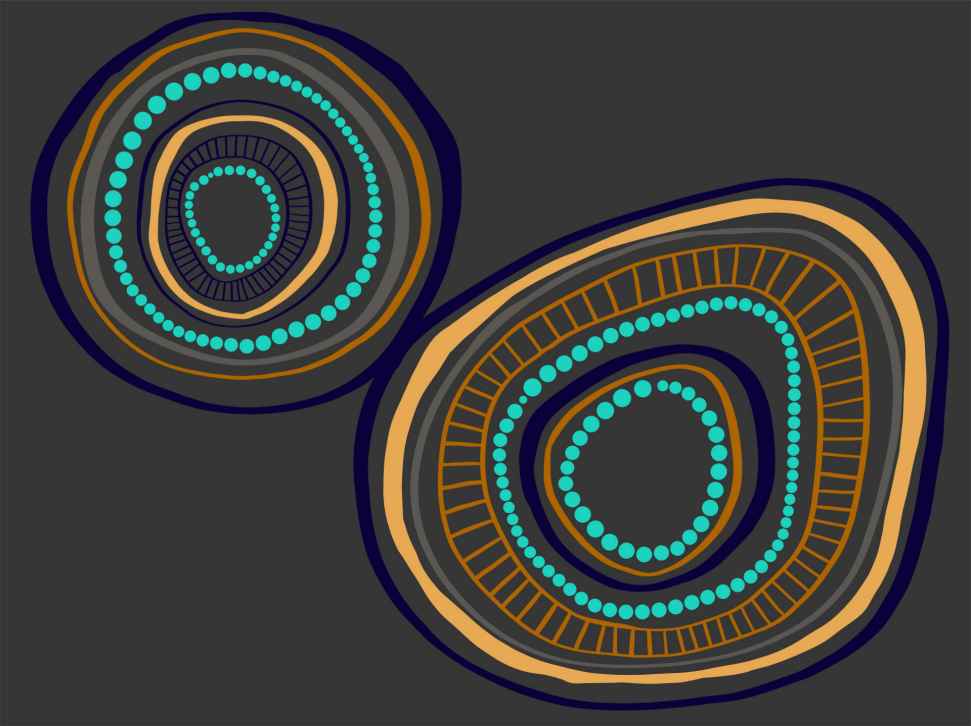Aboriginal and Torres Strait Islander health

The Southgate Institute strives to conduct respectful, participatory research in partnership with Aboriginal and Torres Strait Islander health services, programs and communities. We also ensure the health of Aboriginal and Torres Strait Islander peoples is consistently prioritised in any social determinants and health service research we conduct.
The research group is co-led by Dr Tamara Mackean and Dr Toby Freeman and regularly partners with the Poche Centre for Indigenous Health and Wellbeing and the George Institute for Global Health.
Key areas of expertise
- Social determinants of Aboriginal and Torres Strait Islander health
- Aboriginal and Torres Strait Islander health equity
- Comprehensive primary health care
- Racism and discrimination
Current projects
Decolonising practice in Aboriginal and Torres Strait Islander primary health care

Commissioned artwork by Elizabeth Close
The Decolonising practice in Aboriginal and Torres Strait Islander primary health care project (2018-2022) is partnering with five Aboriginal and Torres Strait Islander primary health care services around Australia to understand and establish an evidence base for decolonising practice in primary health care to address the negative health effects of ongoing colonisation for Aboriginal and Torres Strait Islander peoples.
The project is led by Aboriginal and non-Indigenous researchers, with service partners, and is using cooperative inquiry to establish a theoretical framework for decolonising practice in Aboriginal and Torres Strait Islander primary health care, and build an evidence base for this way of working.
By decolonising practice, we mean taking action to address the negative health effects of ongoing colonisation. This may include strategies such as:
- Aboriginal and Torres Strait Islander leadership and governance
- Employment of Aboriginal and Torres Strait Islander staff
- Working in ways consistent with sovereignty and self-determination
- Anti-racism strategies
- Action and advocacy on social determinants of Indigenous health in the community
- Ways of working that strengthen cultural identity and integrity
- Culturally respectful service provision within a welcoming and safe space
- Integrating Indigenous knowledges
Need for the research
Aboriginal and Torres Strait Islander health services, state government managed or community controlled, are tasked with promoting the health and wellbeing of Aboriginal and Torres Strait Islander peoples. At the same time, there is a wider social, policy, and political environment that is continuing to contribute to ongoing colonisation of Aboriginal and Torres Strait Islander peoples through maintaining unequal power relationships, and inequities in the social determinants of health such as employment, education, housing, incarceration, and racism and discrimination. This ongoing colonisation and inequity negatively affect the health and wellbeing of Aboriginal and Torres Strait Islander peoples, but government policies and strategies addressing Aboriginal and Torres Strait Islander health are often silent on issues of colonisation and power.
Aboriginal and Torres Strait Islander health services to different extents may be able to act on the effects of ongoing colonisation – to contribute to “decolonisation” - to reduce the impact on Aboriginal and Torres Strait Islander peoples’ health and wellbeing. Examples may include collaborating with other sectors to improve social determinants of Aboriginal and Torres Strait Islander health in their local communities, advocating to governments, empowering local communities as a health promotion strategy, and employing Aboriginal and Torres Strait Islander staff.
In 2020 community workshops were held at four of our partner Aboriginal and Torres Strait Islander primary health care sites. This document provides a summary of feedback from community members at these forums.
Chief investigators
Prof Fran Baum, Southgate Institute, Flinders University
Dr Toby Freeman, Southgate Institute, Flinders University
Dr Tamara Mackean, Southgate Institute, Flinders University
Prof Juanita Sherwood, Charles Sturt University
A/Prof Anna Ziersch, Southgate Institute, Flinders University
Prof Annette Browne, University of British Columbia
A/Prof Deb Askew, University of Queensland
Prof Michael Kidd, University of Toronto
More information about the project
Contact Toby Freeman
Email: toby.freeman@flinders.edu.au
Phone: (08) 7221 8468
Artwork
Elizabeth Yanyi Close is an Anangu woman from the Pitjantjatjara and Yankunytjatjara language groups. Elizabeth started painting professionally in 2007, and has been creating large scale street works and has over 20 large scale murals across the Adelaide CBD, interstate and overseas.
Above is the image she created for the project. Elizabeth says the artwork “represents the collaborative responsibility that the health sector has to contribute to decolonising health, it is about bringing our stories together, acknowledging our shared histories in order to move forward with a decolonised and growth mindset.”
Centre for Research Excellence on the Social Determinants of Health Equity
The NHMRC Centre for Research Excellence on the Social Determinants of Health Equity (2015-2020) examines how government policies can work more effectively to address the social determinants of health, so as to improve health and reduce health inequities.
It includes policy case studies on the Northern Territory Emergency Response and the Closing the Gap strategy. The Lowitja Institute is a partner in the Centre.
![]()
Sturt Rd, Bedford Park
South Australia 5042
South Australia | Northern Territory
Global | Online


